#Women of the Third Reich
Text
In World War II, Nazi Germany established brothels in the concentration camps (Lagerbordell, Sonderbauten or Freudenabteilungen "Joy Divisions") to increase productivity among male inmates.
In the end, the camp brothels did not produce any noticeable increase in the prisoners' productivity levels, but instead, created a market for coupons among the camp VIPs.
Here's a few of the locations where this happened:
Mauthausen/Gusen, Auschwitz, Buchenwald, Neuengamme, Dachau, Dora-Mittelbau, Sachsenhausen, Flossenbürg and others
The women forced into these brothels came mainly from the women-only Ravensbrück concentration camp, except for Auschwitz, which "employed" its own prisoners.
In combination with the German military brothels in World War II, it is estimated that at least 34,140 female inmates were forced into sexual slavery during the Third Reich.
The brothels form the subject of "Das KZ Bordell" (The Concentration Camp Brothel) by Robert Sommer, a book that has been hailed as the first comprehensive account of a little known chapter of Nazi oppression in World War Two.
It explores the origins, structure and impact of the "Sonderbauten" (special buildings) run by Heinrich Himmler's SS in Germany and Nazi-occupied Europe.
"In the collective memory and written history of World War Two, the camp brothels were for a long time taboo," the 35-year-old Berliner told Reuters. "The former prisoners didn't want to talk about it: it was a difficult subject to handle."
"It didn't fit so easily into the postwar image of the concentration camps as monuments to suffering."
According to concentration camp survivors the women in those brothels were replaced every 6 months and the women who got replaced were killed in gas chambers.
It is important to note that we distinctively speak of sexual slavery here and of rape.
I wanted to point this out especially because I have been seeing liberal feminists talking about this topic, calling it "forced sex-work", "forced sex-labour" etc.
It is beyond disrespectful to call these female victims "sex-workers" or "employees" when their sexuality was brutally exploited, their diginities taken, their health was sacrificed, they were raped repeatedly and then executed after 6 months, even though they were promised to be released after those months. But those promises of course were never honored.
Liberal feminism and radical feminism differ a lot when it comes to views on the topic of prostitution but this does NOT excuse labeling victims of abuse and rape as "sex-workers" or calling their suffering "forced sex-labour."
#feminism#radical feminists do interact#radblr#radical feminism#world war 2#radical feminists do touch#radical feminist community#radical feminists please touch
484 notes
·
View notes
Text
Brigham Buhler on the Dark History of the Medical Industrial Complex
"There was a small little company that reached out to the Third Reich and said, 'Hey, we need 150 participants for our clinical trial.' The nazi regime shipped 150 healthy jewish women to this pharmaceutical company to test its products. Literally, within six months, there's letters back to the Third Reich from this pharmaceutical company saying, 'Thank you so much for your cooperation. The women arrived in great health and working order. Unfortunately, none of them made it through the initial phases of our trial.' They killed 150 women. 'We kindly request that you send us another 150 women.' That little company became Bayer which is now a mega pharmaceutical company." 🤔
#pay attention#educate yourselves#educate yourself#knowledge is power#reeducate yourself#reeducate yourselves#think about it#think for yourselves#think for yourself#do your homework#do some research#do your own research#ask yourself questions#question everything#news#american history#world history#history lesson#history#medical news#medical tyranny#medical corruption
259 notes
·
View notes
Text







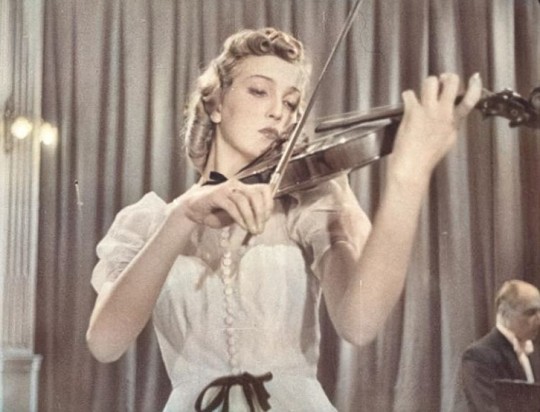

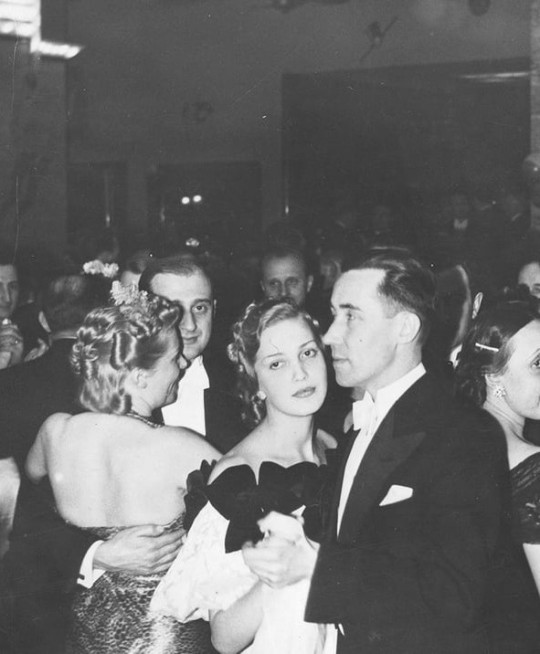
Tamara Wiszniewska (1919-1981) - Polish actress
Tamara Wiszniewska was born on December 19, 1919 in Dubno, Poland (now a region in western Ukraine) on the banks of the Ikva River. It was here that she spent her younger years during which she picked up dancing, which eventually led her to her career in film. In her 1981 obituary in the Democrat & Chronicle, it was reported that Tamara, at age 15, “Was a ballet dancer, when German film director Paul Wegener discovered her and gave her a role in the historical film, August der Starke (August the Strong)” which premiered in 1936. This German/Polish co-production is a biographical look into the life of Augustus II, ruler of Saxony and Poland-Lithuania from 1694-1733. Although Tamara played only a small role it marked her debut and eventual rise to fame within the Polish film industry.
Following her appearance in August der Starke, Tamara appeared in thirteen other films between 1936 and 1939, including Trójka Hultajska (The Trio Hultajska, 1937), Ordynat Michorowski (Ordinate Michorowski, 1937), and Kobiety nad Przepaścią (Women Over the Precipice, 1938). Wladyslaw (Walter) Mikosz, Tamara’s future husband, produced two of these films. In an interview, Tamara and Walter’s daughter, Irene, states that, "The two met because of their film careers, and were married [late that same year] in 1937".
Life for the Mikoszs was happy for a time. Tamara continued to pursue her acting career through 1938 and 1939 and had welcomed a new born daughter into the world alongside her husband, Wladyslaw. Unfortunately, these happy times did not last long as the Mikosz family experienced the rise of Nazi Germany and their occupation of Poland in 1939 during World War II. The following excerpt from an interview with Tamara in a 1974 Times Union tells how drastically their lives were changed:
"I always played a rich spoiled girl who had lovely clothes, and for a short time I lived that kind of life too. It was a short, beautiful life that ended when the Germans took over Poland in 1939. We were wealthy and the toast of the town then. We’d go to Prague and Vienna just to see an opera or to play in the casinos. When the Germans came, my intuition told me I should have something on me to exchange. I sewed my jewelry into my clothes. Later, it bought us passes to freedom and bread so we were never hungry."
The German occupation of Poland during World War II brought then “beautiful” life of the Mikosz family to an end. Gone were their illustrious careers in film and the rewards that such a life had brought to them. In a later interview, Irene mentioned that her mother "was preparing to sign a contract for a film career in Hollywood, but Hitler’s invasion of Poland derailed the plans". Sadly, Tamara’s last appearance on the silver screen was in 1939 prior to the invasion of Hitler’s Germany; she never again starred in any films.
Although her dreams had been crushed, Tamara and her family did not lose hope. They made the best of their current situation, and were able to survive by selling the fruits of their labors that they harvested during their days in the film industry; their lives had been consumed with a fight to survive rather than a dream to thrive. However, not being ones to live quiet lives, the Mikoszs volunteered for the Polish Underground, the exiled Polish government that fought to resist German occupation of Poland during World War II. As civilians with backgrounds in film, Tamara and Walter were most likely engaged in spreading Polish nationalistic and anti-German propaganda. Such efforts of the civilian branch of the Polish Underground was in support of what Jan Kamieński refers to as "small sabotage" in his book, Hidden in the Enemy's Sight: Resisting the Third Reich from Within: "In contrast of major sabotage, the idea of small sabotage was to remind the German occupiers of an enduring Polish presence, to ensure that they felt a constant sense of unease and generally undermine their self-confidence". While attending to these duties within the Underground, the Mikosz family was separated and shipped off to separate countries: Tamara and her daughter, Irene, to Czechoslovakia (where Tamara’s parents had been sent) and Walter to Bavaria. The family was not reunited until 1945, when they were sent to the same refugee camp in Bavaria. The Mikoszs remained in the Bavarian refugee camp until the year 1950, in which they emigrated to the United States of America. Tamara and Walter lived quiet lives in Rochester, NY after arriving from a war-torn Europe, and did so until they passed away.
Although they have long since passed away from this Earth, the stories of the Polish film star, Tamara, and her film-producer husband, Wladyslaw Mikosz, will live on so long as there are people around to tell it.
#history#history crushes#submission#tamara wiszniewska#polish#actress#film history#1930s#30s#old hollywood#women in film#women in history#poland#wwii#world war 2#ww2#ww2 history#old movies#old phography#20th century
130 notes
·
View notes
Text
Underground Jewish courier Chaika Grossman, on riding the trains illegally as a Jew through occupied Poland with forged papers, and all kinds of contraband concealed on one's person [ETA: this sentence is fucked; bc i should have gone to bed 3 hours ago. Sry]:
"Most of the German soldiers were asleep. One, opposite me, still awake, did not stop talking, praising himself, and talking about beautiful Germany. I heard the story about beautiful Germany every time I found myself in the company of German travelers. It was apparently the only non-risky subject they could talk about. Or maybe they just didn’t have anything else to say. I recalled a story told me by Lonka [Kozibrodska]. She had been riding on the train, and her neighbor was an officer, or under-officer. He did not talk about beautiful Germany, but all the way he spoke about himself, boasted and tried to make an impression. True, he had been handsome, tall and blond, with a Nordic face and body — according to Hitler’s 'standards.' His face was without any expression, without a spark of intelligence; but the lines were just right. In his desire to win Lonka’s heart, the German told her that he was an important person. In his pocket he had a letter from the Third Reich Ministry of Health, suggesting 15 of Germany’s beautiful young girls for him to fertilize. If he succeeded in fertilizing all of them he would receive 600 marks as wage and the contract would be renewed for a longer period, and for an additional number of women. When I heard that story every young German seemed to me a bull. I feared them, and mocked them in my heart."
Chaika Grossman, The Underground Army, 126-127.
118 notes
·
View notes
Text
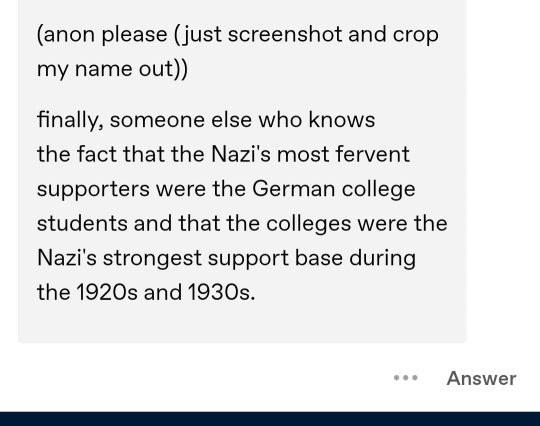
Exactly, Anon. Exactly. This is why the Ivy League Universities being turned into Hamasnik terrorist bases is so horrifying. Especially with Jew-hating students attacking Jewish students and professors on campus, with the Universities' sanction. The Universities could shut these Jew-hate riots down. The fact that they don't shows that they want them to continue. They're trying to chase away the Jewish students and professors from these schools. That's always the first step. That's what the Nazis did first, too.
This article is taken from the US Holocaust Memorial Museum website. I highly recommend that everyone read the whole article. But even if you read the first paragraph, you'll see the parallels to what is happening on Ivy League campuses today:
.
After Adolf Hitler was appointed German Chancellor in January 1933, the new Nazi government began an effort to completely reorder public and private life in Germany.
The Nazi regime quickly targeted German universities—among the most elite in the world at the time—for restructuring according to Nazi principles. While the Nazi Ministry of Education initiated reforms, local Nazi organizations and student activists worked to bring Nazi ideals to German campuses. These forces, along with increasing antisemitism under Nazi rule, transformed everyday life at German universities. Throughout this period, students, faculty, and staff made individual decisions that both upheld and opposed Nazi ideology.
With the passage of the "Law for the Restoration of the Professional Civil Service" in 1933, most Jewish professors in Germany were dismissed from their positions. Others, such as Professor Eugen Mittwoch, were able to keep their posts temporarily only due to the political value of their research. After purging Jewish and "politically undesirable" faculty, the regime then targeted the student body with the "Law Against Overcrowding in Schools and Universities." As German authorities continued to "Aryanize" German universities, Jews increasingly lost the opportunity to teach or study. Many non-Jewish Germans sought to benefit from their persecution.
The daily business of university life continued in the wake of these new policies, but political concerns increasingly influenced the way professors and students worked and studied. The practice of denunciation, as demonstrated by the "Request for the Investigation of Professor Hans Peters," illustrates the danger posed to both students and faculty if they failed to follow new ideological norms. Those willing to voice support for the new regime—whether out of enthusiasm or practicality—often received promotions or other rewards. Meanwhile, many others quietly accepted the new policies and passively benefited from the persecution of their Jewish peers. Very few, such as the small student group in Munich known as the White Rose, took any significant action to resist the Nazi dictatorship.
The Nazi government and its supporters manipulated several aspects of the country's traditional university system to turn German higher education into a crucial source of support for the new regime. For example, the German student population had been largely male long before the Nazi rise to power, and German campuses were dominated by fraternities. Those organizations maintained traditional military discipline and dress codes, and their alumni groups exercised significant political power both before and after 1933. Fraternities—often working with the Student Council and Nazi Student League—served as a powerful and violent force for implementing Nazi principles at universities, often going beyond the party platform in their radicalism. A Report on the Camaraderie House for Female Students of Göttingen shows how Nazi student groups used the format of traditional student organizations to train both men and women to become the next generation of Nazi leaders.
Although the regime could rely on many committed student activists, the Third Reich also sought the support of German professors to lend legitimacy to their policies. Because German universities were state institutions, professors' academic careers became vulnerable to the whims and wishes of the Nazi state. While only a small minority of professors had been Nazi Party members before 1933, several prominent professors quickly voiced their support for the Third Reich. In the new German university, political loyalty was valued over academic ability in the assessment of students and in the selection and promotion of professors. Authorities infused university classrooms with Nazi ideology—as shown in the document, "Foundation of the Advanced School of the German Reich". But prioritizing politics over academics affected the quality of German higher education.
Nevertheless, professors—even enthusiastic supporters of the new regime—often spoke out against some aspects of Nazi policy. The case of Eduard Kohlrausch shows how his opposition to student-led book burnings caused his removal from the university administration. Dissent against individual policies, however, did not give rise to any concerted resistance movements. German universities as a whole formed a solid base of support for the Nazi regime, contributing valuable knowledge to the development of technology for the war effort as well as logistical support for the Holocaust.
The Nazification of universities overwhelmed the daily lives of students with new requirements, including mandatory lectures, physical exercises, labor duties, and political assemblies. Many students resented those requirements, even if they supported the Nazi Party. In Heidelberg, for example, where the daily life of students was dominated by political instruction and mandatory physical training, large numbers of students withdrew from the university in search of other educational opportunities. As illustrated in the "Memo Regarding Maria-Elisabeth Koch," students also showed varying degrees of enthusiasm for the labor service that was often required of them in territories occupied by Nazi Germany.
The Nazi government's project of remaking German universities was broadly successful, but it produced unintended consequences. The quality of education suffered significantly as classes were regularly cancelled for political assemblies and students' schedules became filled with ideological and paramilitary training. Moreover, purging Jewish faculty deprived German universities of valuable expertise. Within a few years, many observers in Germany and abroad became deeply skeptical about the quality of German higher education in the Third Reich. Propaganda efforts such as the Carl Schurz tour for American professors and students—documented with a slickly produced video—did not prevent protest. The 550th-anniversary celebration of Heidelberg University met with opposition in Europe, even while prominent American universities such as Harvard accepted invitations.
With the defeat of the Third Reich in 1945, Allied forces occupying Germany began a long-term effort to remove the influence of Nazi ideology in German society. Many German academics who made significant contributions to the Nazi war effort fled to the United States, where they lived comfortable lives and their expertise was highly valued by American universities and the US military. In postwar Germany, many faculty and students who had benefited from the Nazis' discriminatory policies without being especially vocal or enthusiastic supporters of the regime sought to cast their dissent or their silence as forms of political resistance to obscure their own complicity. Although many Germans denied having supported the Nazi regime, antisemitism persisted in postwar Germany. The case of Hermann Budzislawski shows the difficulties encountered by the relatively few German Jews who decided to return to Germany after World War II.
Sources in this collection document the choices facing students and faculty pursuing their everyday lives in the shadow of Nazism and the Holocaust. Over the course of this period, as antisemitic discrimination escalated to mass murder, the higher education system proved to be a source of support—rather than opposition—to the party's project of remaking German society.
#jumblr#jewish history#the goyim are trying to speedrun the 1930s#goyim have always naively asked “How could the Nazi regime have murdered 6 million Jews??” - and now they're giving us the answer#Jew-hate makes you stupid#NOTE: I report and block antisemites. Any antisemites who comment on this post will be reported and blocked. You have been warned.
141 notes
·
View notes
Text
Occupied Palestine ("Israel"), is quite literally beating the dead horse that is the "Hamas" or "Oct. 7 2023" arguments. Which should not be surprising to anyone as the U.S., U.K., Canada, France, Spain and Germany have all done similar when it came to talking about the people they have committed Genocide and/or war crimes against. Notably the U.S.'s long list of people including (but not limited to);
Iraqis, Afghans, Haitians, Laotians, Vietnamese, Koreans, Japanese, Puerto Ricans, Black Americans and Africans, Mexicans, and countless of Indigenous people of Turtle Island/American.
The Third Reich did the same with their propaganda to push and encourage men and women to help with the war and genocide from 1933-1945. In reality, it's no surprise that Occupied Palestine's legal team is continuing in the footsteps of Daddy Genocidal Joe and Mommy Blood Money Royalty.
Occupied Palestine is continuing to shove their own feet into their mouths, and most of the world has had enough of them saying the same lies over and over again. However, some people are more focused on punishing them before freeing Palestine.
Remember, we have to walk before we can run. In WW2 the primary focus during the war was stopping the Axis powers, then the focus shifted to pushing them once they flew the white flag.
We have to stop the genocide before we punish it or else Palestine will continue to suffer and will suffer even more.
Take baby steps. Listen to the people of Palestine, support South Africa and Yemen in their efforts of stopping the genocide. We have to walk before we can run.
From the river
to the sea,
Palestine will be free 🕊️
Note: the order of countries is supposed to be in a rough historical order
#palestine#free palestine#free gaza#south africa#yemen#fuck israel#fuck zionists#anti zionisim#anti zionism is not antisemitism#human rights#genocide#fuck the usa#fuck the uk#fuck germany#the war is not over#from the river to the sea palestine will be free
63 notes
·
View notes
Text
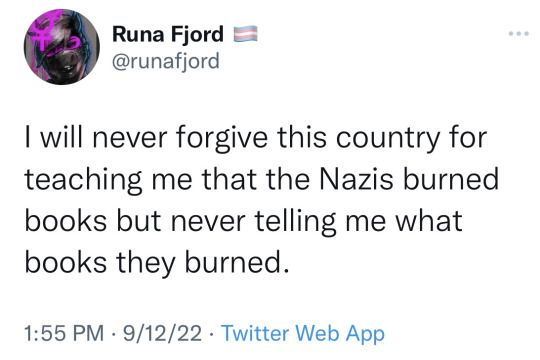
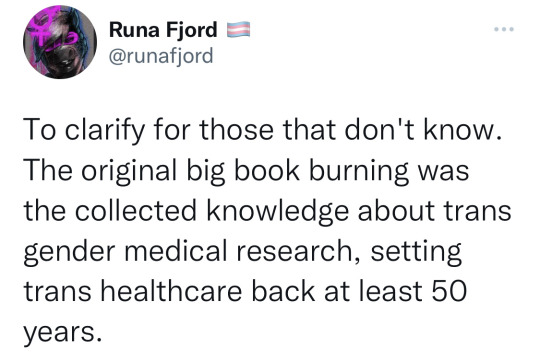
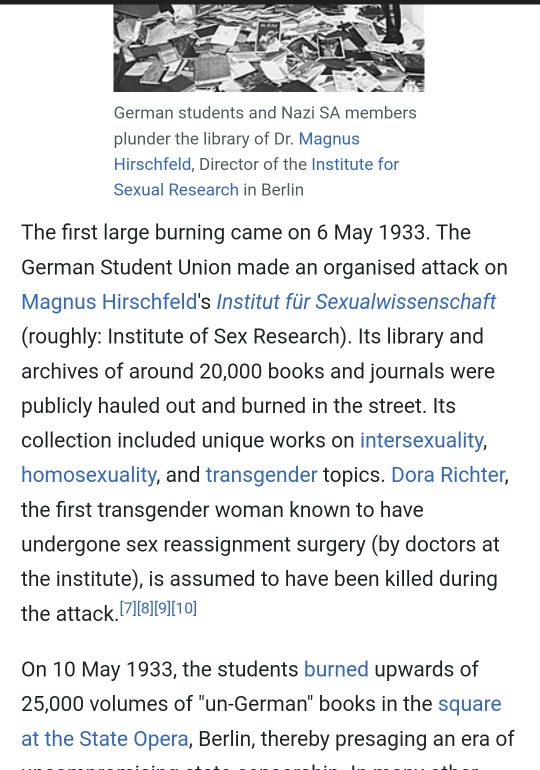

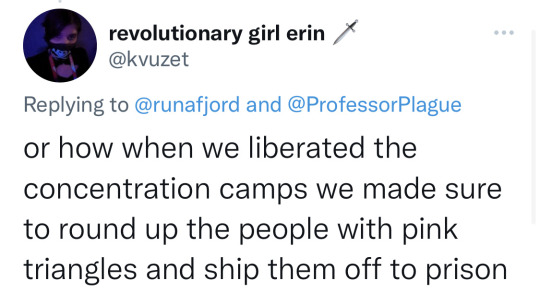
Berlin had become the “gay capital of the world,” a city with a booming queer nightlife scene and the center of new academic ideas calling for greater acceptance of homosexuality and gender non-conformity.
To the Nazis, homosexuality represented a “threat” to the “Aryan” race’s survival that needed to be stamped out. Although male homosexual activity had been technically illegal in Germany since the 19th century, it was generally tolerated and even celebrated prior to Adolf Hitler’s ascension to power in 1933.
The Nazis began their anti-queer purges by targeting clubs, societies and Magnus Hirschfield’s renowned sexology research institute, burning the books in its library. Decades of pioneering work and community life had been erased.
By 1935, Paragraph 175 of the German penal code was revised to include a harsher sentence and criminalize virtually any kind of male same-sex intimacy.
Between 1933 and 1945, an estimated 100,000 men were arrested for violating Nazi Germany’s law against homosexuality, and of these, approximately 50,000 were sentenced to prison. An estimated 5,000 to 15,000 men were sent to concentration camps on similar charges.
In the concentration camps, they were subjected to barbaric tortures, including sexual abuse, castration and medical experiments. The other prisoners also ostracized them. Overall prospects for gay prisoners were poor: an estimated 65% died, and an unknown, albeit likely disproportionate number committed suicide.
As the Allies swept through Europe to victory over the Nazi regime in early 1945, hundreds of thousands of concentration camp prisoners were liberated. The Allied Military Government of Germany repealed countless laws and decrees, but left unchanged the 1935 Nazi revision of Paragraph 175.
For the queer survivors of Nazi oppression, 1945 did not bring about any kind of liberation; rather, it marked the beginning of a systematic process of persecution and willful suppression—one that would result in their erasure from the pages of popular history.
Under the Allied occupation, homosexual concentration camp survivors were forced to serve out their terms of imprisonment regardless of time served in the concentration camps. They were easy to identify because in the concentration camps they had an upside-down pink triangle sewn to their clothes.
After the war, Jews, children, and political prisoners could apply for financial and moral support from the new German governments (a.k.a. reparations), homosexual men could not. Similarly, gay survivors were not allowed to collect a pension for the time they spent working in the concentration camps while other survivors could.
The Nazi version of Paragraph 175 remained on the books of the Federal Republic of Germany (West Germany) until the law was revised in 1969 to decriminalize homosexual relations between men over the age of 21. This resulted in the arrest of around 100,000 gay men between 1945 and 1969. Paragraph 175 itself would only be entirely removed from the penal code in 1994, following Germany’s reunification.
Advocacy groups successfully rallied for the creation of memorials, and the German Bundestag finally voted to pardon and compensate the victims of Paragraph 175 in 2017, a meager and all-too-late offer of justice as most of the victims were long dead.
The Nazi-era oppression of queer women and intersex individuals has been overshadowed due to a combination of homophobia and sexism. Lesbian women, for instance, may not have been systematically persecuted under the Third Reich, as Paragraph 175 only targeted gay men, but that did not deter the Nazis from shutting down their clubs or arresting them for “anti-sociality,” deeming them “morally unsound,” labeling them as “lesbisch” (lesbian) political dissidents and sending them to concentration camps.
For years, LGBTQ organizations were ignored and even shunned from Holocaust commemorations. The gathering of their stories was not considered important. The suppression of the Holocaust’s queer voices remains a stain that lingers on to this day.
#queer history#scary how fast things changed#from gay capital of world to concentration camps#never forget#long post
706 notes
·
View notes
Text
Wanna learn about women history and WWII? Here is a non-exhaustive list to get you started
German women and the Nazi regime
Mothers in the Fatherland: Women, the Family and Nazi Politics, Claudia Koonz
Female SS Guards and Workaday Violence: The Majdanek Concentration Camp, 1942-1944, Elissa Mailänder
Zwangssterilisation im Nationalsozialismus: Studien zur Rassenpolitik und Frauenpolitik, Gisela Bock
Hitler's Furies: German Women in the Nazi Killing Fields, Wendy Lower
"Backlash against Prostitutes' Rights: Origins and Dynamics of Nazi Prostitution Policies," in Journal of the History of Sexuality Julia Roos
"German Women and the Holocaust in the Nazi East," Wendy Lower, in Women and Genocide, Elissa Bemporad & Joyce W. Warren
Frausein im Dritten Reich, Rita Thalmann
Women as victims or perpetrators of the Holocaust (general)
"Women and the Holocaust: A Reconsideration of Research," in Signs, Joan Ringelheim
Women in the Holocaust, Dalia Ofer & Lenore J. Weitzman
Das KZ-Bordell: Sexuelle Zwangsarbeit in nationalsozialistischen Konzentrationslagern, Robert Sommer
SS-Bordelle und Oral History. Problematische Quellen und die Existenz von Bordellen für die SS in Konzentrationslagern, Christa Paul & Robert Sommer
Sexual Violence during the Holocaust—The Case of Forced Prostitution in the Warsaw Ghetto, in Shofar: An Interdisciplinary Journal of Jewish Studies, Katarzyna Person
"Gender: A Crucial Tool in Holocaust Research," Marion Kaplan, in Women and Genocide, Elissa Bemporad & Joyce W. Warren
Different Voices: Women and the Holocaust, Carol Rittner & John K. Roth
Resilience and Courage: Women, Men, and the Holocaust, Nechema Tec
« Reframing Sexual Violence as a Weapon and Strategy of War: The Case of the German Wehrmacht during the War and Genocide in the Soviet Union, 1941–1944 », in Journal of the History of Sexuality, Regina Mühlhäuser
Sex and the Nazi soldier. Violent, commercial and consensual encounters during the war in the Soviet Union, 1941-45, Regina Mülhäuser
Romani women during the Holocaust
« Krieg im Frieden im Krieg: Reading the Romani Holocaust in terms of race, gender and colonialism », Eve Rosenhaft
« Hidden Lives : Sinti and Roma Women », Sybil Milton
« Romani women and the Holocaust Testimonies of Sexual Violence in Transnistria », Michelle Kelso
"No Shelter to Cry In: Romani Girls and Responsibility during the Holocaust," Michelle Kelso, in Women and Genocide, Elissa Bemporad & Joyce W. Warren
Jewish women during the Holocaust
Jewish women's sexual behaviour and sexualized abuse during the Nazi era, in The Canadian Journal of Human Sexuality, Beverley Chalmers
Sexual Violence against Jewish Women During the Holocaust, Sonja M. Hedgepeth & Rochelle G. Saidel
Persecution of lesbians by the Nazis
Days of Masquerade: Life Stories of Lesbians during the Third Reich, Claudia Schoppmann
Nationalsozialistische Sexualpolitik und weibliche Homosexualität, Claudia Schoppmann
“This Kind of Love”: Descriptions of Lesbian Behaviour in Nazi Concentration Camps, from Nationalsozialistische Sexualpolitik und weibliche Homosexualität, Claudia Schoppmann
Queer in Europe during the Second World War, Regis Schlagdenhauffen
Ravensbrück
Ravensbrück. Everyday Life in a Woman’s Concentration Camp 1939-45, Jack G. Morrison
Ravensbruck: Life and Death in Hitler's Concentration Camp for Women, Sarah Helm
Women and the Memory of WWII
Women, Genocide, and Memory: The Ethics of Feminist Ethnography in Holocaust Research, in Gender & Society, Janet Jacobs
Lessons Learned from Gentle Heroism: Women's Holocaust Narratives, in The Annals of the American Academy of Political and Social Science, Myrna Goldenberg
« An Austrian Roma Family Remembers: Trauma and Gender in Autobiographies by Ceija, Karl, and Mongo Stojka », Lorely French
Beyond Survival: Navigating Women's Personal Narratives of Sexual Violence in the Holocaust, Roy Schwartzman
Comfort Women and imperial Japan
Comfort Women: Sexual Slavery in the Japanese Military During World War II, Yoshimi Yoshiaki
The Comfort Women: Japan’s Brutal Regime of Enforced Prostitution in the Second World War, George Hicks
The Japanese Comfort Women and Sexual Slavery During the China and Pacific Wars, Caroline Norma
Lola's House: Filipino Women Living With War, Evelina Galang
Soviet Women during WWII
« “Girls” and “Women”. Love, Sex, Duty and Sexual Harassment in the Ranks of the Red Army 1941-1945 », in The Journal of Power Institutions in Post-Soviet Societies, Brandon M. Schechter
Soviet Women on the Frontline in the Second World War, Roger D. Markwick & Euridice Charon Cardona
Soviet Women in Combat. A History of Violence on the Eastern Front, Anna Krylova
#^ i know way more about the holocaust and women than other topics and that's why there are barely any books on women soldiers (except for#german women soldiers - duh - and soviet women (that's bc they were assigned readings))#and i included stuff in german because those books haven't been translated in english but i still think my german speaking mutuals would be#interested in them#holocaust#wwii#herstory
86 notes
·
View notes
Text
I just found out that some pro-Palestine people are turning on the fandom mode (In short, the worst sides, i.e. doxing, rape threats, etc.), I'm begging you people, let's not behave this way, because it doesn't help, but harms, we are fighting for the lives of children, women and other people who are victims of Israel, not to go crazy, people from the UK, people from the USA and Jews from outside Israel are not guilty of anything, I'm not perfect, but it's one thing to write something under the influence of emotions, and another thing is to do it just to feed your ego (I communicate the same tone and this type of things, unless, like I use Google translator, which kills the message and then they want to eat you for it that Google translator couldn't capture what it was supposed to translate, threatening others with rape or death probably won't achieve much)
And no, pro-Israel is not better either, he calls everyone anti-Semites, or says that all Israel's crimes are "Anti-Semitic propaganda", and if you live in Poland, he may accuse you that your family is responsible for sending Jews to concentration camps , even if it's a lie (Now imagine, that someone is a generation of people who saved Jews and other people, and now they get such crap from a pro-Israel person, it's just disgusting)
In addition, many pro-Israel people prefer to deny the fact that Jews were not the only victims of this crazy man, or they cannot stand the thought that if Muslims lived in Europe, this man would probably not be very friendly to them (Hello, Roma too were victims, connect the facts), argument, just because one Islamist liked Hitler (to put it mildly) does not mean that all Islamists were for him (Hello, many Germans were not for him, so that shows how the world is more complicated)
And let me remind you, Disney was friends with a woman who loved the Third Reich, but somehow people keep silent about it, because apparently there is nothing wrong with friendship with people with "different" views (Tia… I will never understand these people, I will not let advice on being friends with someone who is right-wing and not because I am left-wing, but because that a lot of fucking right-wingers are bigots)
Pro-Israel pisses me off for pretending that there is no genocide, or for calling everyone "Anti-Semites" (And, as I have said many times, they kill the seriousness of the word), that's why I can't look at Pro-Israel the way I look at fandoms, for example other productions, because it's one thing to like a different production than others,
and the second is to be in favor of a country that murders children and innocent civilians, yes, the context is more important
So yes, some pro-Palestine people, get a grip of yourself, and those Pro-Israel people, think about your values, because if you defend genocide, it's probably not a reason to be proud
#free palestine#palestine#pro palestine#pro israel#israeli#israel#fuck israel#genocide#isreal#gaza#free gaza#problematic
26 notes
·
View notes
Note
You can be antizionst, I honestly don't care for your personal opinion.
But when you speak out, a jewish person, against most of your jewish siblings, you are actively hurting us all.
You being publicly jewish and anti zionist, which is a term mostly used to sugar coat antisemitism (my grandma's polish passport taken after the holocaust because "anti Zionism" for example), is used by real antisemitic people in the same way republican use conservative black people, and sexits use conservative women.
Idk, just felt like telling you my opinion.
I really don't intend to hurt you or anything like that. If it comes off as super harsh, please forgive me.
Have a great day!
I'm not speaking out against anything Jewish. Zionism isn't Jewish, and you don't have to be Jewish to be a zionist any more than you have to be a zionist to be Jewish. If there are a number of zionist Jews, that's a problem of zionism, just as the fact that there are white people who are racist or sexist or otherwise bigoted doesn't make white folk the problem. Still you say I'm hurting us all, as the usamerican conservatives say that learning the truth of slavery and antiblackness during the pre- and post-Civil War eras hurts white students? I'm not the one making us look bad; look instead to Netanyahu or Ben-Gvir or Gallant, and judge yourself not for the actions of your kin but by your own actions alone.
Let's put aside the way those same conservatives use zionism to push the far-right ideologies of Likud, Otzma Yehudit, and similar groups into the mainstream of Jewish, Christian, and contemporary western culture. Let's just focus on the issue of antisemitism, on a small scale or on a larger scale. Let's focus on October 7th, or the Tree of Life synagogue shooting, or the Shoah, or all number of incidents prior or since. Why is October 7th seen as the start of an onslaught that has been ongoing since last century? Why do we as a broader culture know of the Tree of Life but not of the Cave of the Patriarchs? Why do we teach students about the Shoah but not the Nakba? Why do you think Jewish people are worth more than the millions of Palestinians that have been killed, maimed, sickened, starved, abducted, terrorized, or displaced by Israel for eight decades? Why should I consider the threat of another October 7th to be a reason to excuse to commit a cultural genocide or a murderous, exterminationist genocide of over two million people, by right of skin color and a landlord's dreams of real estate? Because one side is my people? You're all my people. Every life on this planet is one of my people, and if my own mother, sweet as she is, committed a sin so grievous I'd do anything I could to bring her to justice.
I'm sorry your grandma had issues of antisemitism. You and I have experienced it too, I assume, though likely not as a systemic issue. I personally lived in Pittsburgh, Pennsylvania when the congregation of Etz Chayyim-Or L'Simcha was attacked by a neonazi. I know all too well how antisemitism can spread, unprompted and unabashedly. If you want to put antisemitism to rest, turning "our people" into a country of genocide apologists is not the way to do it. To call antizionism a form of antisemitism is true antisemitism, because it's a way of preying upon the fears of a people that have already been through so much in recent memory. Israel will be judged for Israel's behavior. The dream of avoiding antisemitism is not worth another holocaust.
The Israeli occupation and annexation of Palestine, so soon after watching the post-9/11 descent of my entire country into islamophobia and war, is the single issue that radicalized me into politics as a teenager back in 2005/2006. If I can help others learn what I learned and see what I've seen, then I think it's worth some hard feelings.
Speaking of hard feelings, don't forget: After World War I and the Great Depression, the people of Germany thought the Third Reich had a reason to rule as they did. I speak out against zionism because one grave sin does not permit another. Don't give Likud an excuse to be the modern era's new Nazis.
#palestine#genocide#antisemitism#antizionism#jumblr#hi jumblr! i know it's controversial to tag antizionism under jumblr but the jews that are uncomfortable with this need to hear it most#take care of yourselves everybody#block and move on
25 notes
·
View notes
Photo

On this day, 6 December 1938, after word of the antisemitic pogrom by the Nazis known as the Kristallnacht began to reach Australia, Aboriginal people held a protest against it (content note: Aboriginal and Torres Strait Islander viewers are warned that this post features an image of a deceased person). A dozen men and women of the Australian Aborigines’ League, led by 78-year-old William Cooper (pictured), of the Yorta Yorta people, marched to the German Consulate in Melbourne to deliver a letter to Dr. Drechsler, Consul General to the Third Reich, stating: "On behalf of the Aboriginal inhabitants of Australia, we wish to have it registered and on record that we protest wholeheartedly at the cruel persecution of the Jewish people by the Nazi government in Germany. We plead that you would make it known to your government and its military leaders that this cruel persecution of their fellow citizens must be brought to an end." Today a plaque at the Melbourne Holocaust Museum commemorates the Australian Aborigines’ League delegation's attempt to present their letter to the German consul. https://www.facebook.com/workingclasshistory/photos/a.296224173896073/2153330918185380/?type=3
241 notes
·
View notes
Text
Some stuff about queer culture in Weimar Berlin
Note: Das Institut für Sexualwissenschaft does not have a definitively used translation from what I see -- have seen Institute of Sexology (my preferred translation), Sexual Science, Sexual Research, Sexual Knowledge etc. It’s all the same place.
any further suggestions, feel very welcome to add!
*
ONLINE:
the wikipedia for the institute: yeah, yeah it’s wikipedia, but get some groundwork done here if you know nothing at all, so the next set of recommendations don’t overwhelm you
Remembering Dora Richter, One of the First Women to receive Gender-Affirming Surgery: good introduction to the Institute of Sexology, with a focus on one of the women who lived, worked, and received care there
On the Clinics and Bars of Weimar Berlin: a more in-depth article about the institute, some of the people who sought to get support via it, and the surrounding culture of the time
The Magnus Hirschfeld Society: a lot of their work is published online, in German, French, and English. Hours of fun.
Interview with the author Laurie Marhoefer: discussing his book (mentioned below) Sex and the Weimar Republic, which focuses on various fronts to sexual liberation in the Weimar Republic, including the limitations of assimilationist approaches*
*Marhoefer is currently working on their third book centred on queer persecution during the Third Reich, which “centrally analyzes racism as a vector of persecution,” so that’s something to keep an eye out for too
The Asian Canadian gay activist whose theories on sexuality were decades ahead of their time: an article about Li Shiu Tong, by Marhoefer, who also wrote a book about him (see below). The title really says it all
The Transvestite Magazine of Weimar Berlin: a series of magazines that were published until 1933 when the crackdown on queer rights resulted in the destruction of the Institute of Sexology, featuring examples of voices almost completely overlooked -- transvestites who were simply living their lives
The Institute for Sexualwissenschaft: this blog post goes into something I’ve been thinking as well -- the parallels between the anti-queer/anti-trans violence perpetuated by the German government before, during, and after the Nazis and the anti-queer/anti-trans rhetoric and violence today. Where would we be if all that research had survived? (and luckily, some of it has!)
*
BOOKS
Der Liebe und Dem Leid: Das Institut für Sexualwissenschaft 1919-1933: a recent German historical account of the institute of Sexology that I desperately want to get my hands on
Sex and the Weimar Republic: German Homosexual Emancipation and the Rise of the Nazis: explores intersectional fights for queer emancipation during the Weimar Republic and its limitations
Racism and the Making of Gay Rights: A Sexologist, His Student, and the Empire of Queer Love: goes deeper into the story of Li Shiu Tong, who was an impressive researcher at the institute and whose contribution to sexual and gender philosophies is being reconsidered at the moment!
Magnus Hirschfeld: The Origins of the Gay Liberation Movement: a biography of Magnus Hirschfeld and his central role in the queer liberation movement of the time
The Masculine Woman in Weimar Germany: looks at the depictions of women who didn’t conform to standard gendered and sexual expectations from 1918-1933 and explores their role to understand gendered lives and experiences at this point in German history
The Hirschfeld Archives: Violence, Death, and Modern Queer Culture: a book I desperately want to read on anti-queer violence in the early 20th century, focusing on the Institute of Sexology and its destruction, which has gathered archival material from “over a hundred published and unpublished books, articles, films and photographs.”
Gay Berlin: Birthplace of a Modern Identity: another broader book about Berlin. I’m interested in the subtitle “birthplace of a modern identity” as potentially exploring the ways Berlin was the centre of explorations that despite the Nazis best efforts are still alive and -- with setbacks -- remembered today
Queer Identities and Politics in Germany: A History, 1880-1945: Idk what to tellya it’s about queer identities and politics in Germany between 1880-1945
*
ISHERWOOD
British author Christopher Isherwood spent some time in Berlin, notably including a stay at the Institute of Sexology. This time resulted in “The Berlin Stories,” as well as a section in “Christopher and his Kind” (his autobiography).
These stories were turned into the play+film “I Am A Camera” and the musical+movie “Cabaret”
The 1993 Alan Cumming and Jane Horrocks Cabaret (one of my favourite things in the world)
Opening of the 1972 movie
(according to a 1977 biography of Isherwood, he denounced the Berlin Stories in a 1956 essay: “He regretted depicting many persons as "monsters" and noted they were "ordinary human beings prosaically engaged in getting their living through illegal methods. The only genuine monster was the young foreigner who passed gaily through these scenes of desolation, misinterpreting them to suit his childish fantasy."” -- that being said, the people in those books are still very, very interesting and -- despite Isherwood’s initial limitations/biases -- beautiful in their realities)
*
OTHER MOVIES
Anders als die Andern and Laws of Love -- two movies produced via the institute exploring same-sex relationship rights. I haven’t seen the latter yet (it was only restored in 2021, nearly a hundred years after it was released), but it was heavily censored. The former (with the famous German actor Conrad Veidt as a lead) is considered the first movie to overtly show homosexuality. They’re both on the Internet Archive
The Einstein of Sex: Life and Work of Dr. M. Hirschfeld: by cult film-maker Rosa von Praunheim that explores the opening of the institute up until the 30s. I haven’t seen it yet, but very excited! EDIT: currently watching and it’s definitely On A Budget, but a good rundown of Hirschfeld’s life. On youtube with english subs. EDIT 2: having finished it, am interested in how it portrayed Dora Richter (that it had her in it at all was great) -- not completely accurate, but a labour of love
Paragraph 175: a 2000 movie documenting some of the gay men who experienced the violence of the law under Nazi regime and afterwards. This film is simply made, and there aren’t many men featured in it -- it feels like it’s trying to get the story told before they lost their chance completely. The stories are very brutal. It starts pre-war. One of the men talking is the French author Pierre Seel, who lived until 2005 and received recognition as a holocaust survivor in 2003, in part due to this film and his own memoir
Great Freedom: this actually takes place post-war, but another insight into what Paragraph 175 was. the main character was in a concentration camp, but it’s not depicted. I simply think it’s good, although it’s mildly off-topic.
*
MISC
this has focused a lot on the Institute of Sexology, but I’d like to read some works on Helene Stöcker and the World League for Sexual Reform
#resources#queer stuff#queer resources#weimar berlin#magnus hirschfeld#li shiu tong#laurie marhoefer#heike bauer#paragraph 175#die institut für sexualwissenschaft#weimar germany#cabaret#christopher isherwood#queer history#queer germany#germany#queer literature#queer non-fiction#queer cinema
164 notes
·
View notes
Text
Christopher Nolan’s highly-anticipated movie “Oppenheimer,” set for release July 21, 2023, depicts J. Robert Oppenheimer and his role in the development of the atomic bomb. But while the Manhattan Project wouldn’t have been possible without the work of many accomplished female scientists, the only women seen in the movie’s trailer are either hanging laundry, crying or cheering the men on.The only women featured in the official trailer for Christopher Nolan’s ‘Oppenheimer’ are crying, hanging laundry or supporting the men.
As a physics professor who studies ways to support women in STEM – science, technology, engineering and math – fields and a film studies professor who worked as a screenwriter in Hollywood, we believe the trailer’s depiction of women reinforces stereotypes about who can succeed in science. It also represents a larger trend of women’s contributions in science going unrecognized in modern media.
Lise Meitner: A pioneering role model in physics
The Manhattan Project would not have been possible without the work of physicist Lise Meitner, who discovered nuclear fission. Meitner used Einstein’s E=MC² to calculate how much energy would be released by splitting uranium atoms, and it was that development that would prompt Einstein to sign a letter urging President Franklin Roosevelt to begin the United States’ atomic research program.
Einstein called Meitner the “Madame Curie of Germany” and was one of a pantheon of physicists, from Max Planck to Niels Bohr, who nominated Meitner for a Nobel Prize 48 times during her lifetime.
Meitner never won. Instead, the prize for fission went to Otto Hahn, her male lab partner of 30 years in Berlin. Hahn received the news of his nomination under house arrest in England, where he and other German scientists were being held to determine how far the Third Reich had advanced with its atomic program.
Of Jewish descent, Meitner had been forced to flee the Nazis in 1938 and refused to use this scientific discovery to develop a bomb. Rather, she spent the rest of her life working to promote nuclear disarmament and advocating for the responsible use of nuclear energy.
Meitner was not the only woman who made a significant contribution during this time. But the lack of physics role models like Meitner in popular media leads to real-life consequences. Meitner doesn’t appear as a character in the film, as she was not part of the Manhattan Project, but we hope the script alludes to her groundbreaking work.
A lack of representation
Only around 20% of the undergraduate majors and Ph.D. students in physics are women. The societal stereotypes and biases, expectation of brilliance, lack of role models and chilly culture of physics discourage many talented students from historically marginalized backgrounds, like women, from pursuing physics and related disciplines.
Societal stereotypes and biases influence students even before they enter the classroom. One common stereotype is the idea that genius and brilliance are important factors to succeed in physics. However, genius is often associated with boys, and girls from a young age tend to shy away from fields associated with innate brilliance.
Studies have found that by the age of 6, girls are less likely than boys to believe they are “really, really smart.” As these students get older, often the norms in science classes and curricula tend not to represent the interests and values of girls. All of these stereotypes and factors can influence women’s perception of their ability to do physics.
Research shows that at the end of a yearlong college physics course sequence, women with an “A” have the same physics self-efficacy as men with a “C”. A person’s physics self-efficacy is their belief about how good they are at solving physics problems – and one’s self-efficacy can shape their career trajectory.
Women drop out of college science and engineering majors with significantly higher grade-point averages than men who drop out. In some cases, women who drop out have the same GPA as men who complete those majors. Compared to men, women in physics courses feel significantly less recognized for their accomplishments. Recognition from others as a person who can excel in physics is the strongest predictor of a student’s physics identity, or whether they see themselves as someone who can excel in physics.
More frequent media recognition of female scientists, such as Meitner, could vicariously influence young women, who may see them as role models. This recognition alone can boost young women’s physics self-efficacy and identity.
When Meitner started her career at the beginning of the 20th century, male physicists made excuses about why women had no place in a lab – their long hair might catch fire on Bunsen burners, for instance. We like to believe we have made progress in the past century, but the underrepresentation of women in physics is still concerning.
Diversity as an asset to science
If diverse groups of scientists are involved in brainstorming challenging problems, not only can they devise better, future-oriented solutions, but those solutions will also benefit a wider range of people.
Individuals’ lived experiences affect their perspectives – for example, over two centuries ago, mathematician Ada Lovelace imagined applications far beyond what the original inventors of the computer intended. Similarly, women today are more likely to focus on applications of quantum computers that will benefit their communities. Additionally, physicists from Global South countries are more likely to develop improved stoves, solar cells, water purification systems or solar-powered lamps. The perspectives that diverse groups bring to science problems can lead to new innovations.
Our intention is not to disparage the “Oppenheimer” movie, but to point out that by not centering media attention on diverse voices – including those of women in physics like Meitner – filmmakers perpetuate the status quo and stereotypes about who belongs in physics. Additionally, young women continue to be deprived of exposure to role models who could inspire their academic and professional journeys'
74 notes
·
View notes
Note
https://www.tumblr.com/fierceawakening/744855688703066112?source=share
what are your thoughts on this???
oh ive seen this and i have seen this narrative plenty of times before. they are usually referring to the books by sexual scientist magnus hirschfeld who did research on transsexuality (as it was understood at the time). now guess what he was? jewish. yet they insist they burned the books because of transphobia. i find that notion to be antisemitic. homosexuals were persecuted by the nazis and back then transsexuals and homosexuals were the same group. this historic revisionism is sickening and im embarrassed that takei takes part in it, as a gay man. the nazis considered everything „entartet“ that wasnt aligned with national socialism, and persecuted people „lebensunwert“ that did not fit their ideal of an aryan, physically fit man (women had to be mothers) who only produces and consumes nazi approved media and supports the nsdap goals. among the groups persecuted by the nazis were communists, democrats, prostitutes, homosexuals, roma, and so on.
they gave badges to the people they put in concentration camps.

it says:
political - criminal - emigrant - bible scientist - homosexual - asocial (in the top row)
and:
colours - backsliders - prisoners of the penal colony - jews (on the left)
and in the last part „special badges“:
jewish race desecrator - race desecrator - suspected of escape - pole - czech - member of the wehrmacht
do you see trans people here? they were not specifically persecuted. transgender was not even a thing back then. crossdressing - which again, was a thing associated with gay men, and homosexuality obviously threatens the traditional family model that the nazis wanted - would have either „earned“ you a homosexual or asocial badge. prostitutes would have been considered „asocial“ as well that is really just a category for anyone not fitting nazi ideals, political opponents, whatever.
gender was not a thing in the third reich it was literally first conceptualised by feminists later on. its really shocking how common this false narrative is and even celebrities parrot it just to be able to call gender critical people „nazis“.
#ask#they burned books by marx and other communists#yet you dont see people going around calling people criticising communism nazis#i hope probably some idiot out there doing that
14 notes
·
View notes
Text
trigger warning // nazi history, misogyny


Shiv's reaction to Mencken breaks my heart :(
"Kinder, Küche, Kirche" is a German phrase meaning "children, kitchen, church" that was used during the German Empire to define a woman's societal role. It now carries a derogatory connotation and represents an outdated view of women in contemporary Western society. During the Third Reich, the Nazi regime prioritized women's roles as mothers and homemakers, promoting policies and propaganda centered around "Kinder" (children) and "Küche" (kitchen). Women were encouraged to stay at home and focus on their household responsibilities. Employment discrimination against women was widespread, with certain professions reserved exclusively for men. After World War II, the phrase continued to be discussed in feminist and anti-feminist literature, often criticized for portraying women's roles as limited and restrictive.
#shiv roy girl you better kick mencken's ass too !!#team shiv#shiv roy defender#justin kirk the actor that you are#jeryd mencken#shiv roy#justin kirk#sarah snook#kinder küche kirche#misogyny#succession#succession hbo#hbo#succession spoilers#trigger warning#n*zi#patriarchy#fuck nazis#fuck republicans
72 notes
·
View notes
Text
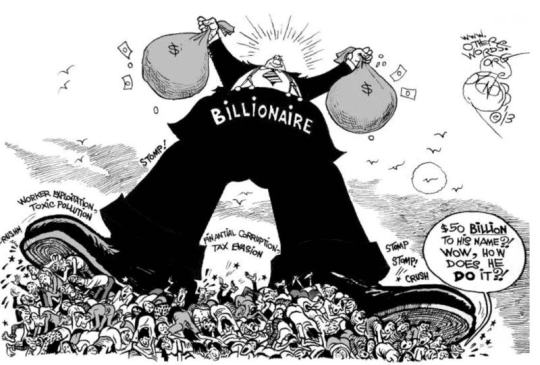
The real choice isn’t “pragmatism” or “idealism.” It’s either allowing these trends to worsen – destroying what’s left of our democracy and turning our economy into even more of a playground for big corporations, Wall Street, and billionaires – or reversing them. And the only pragmatic way of reversing them is through a “political revolution” that mobilizes millions of Americans.
Robert Reich (via azspot)
+
LETTERS FROM AN AMERICAN
HEATHER COX RICHARDSON
MAR 2, 2024
On February 25, 1901, financier J. P. Morgan’s men filed the paperwork to incorporate a new iron and steel trust, and over the weekend, businessmen waited to see what was coming. Five days later, on March 2, the announcement came: J. P. Morgan was overseeing the combination of companies that produced two thirds of the nation’s steel into the United States Steel Corporation. It was capitalized at $1.4 billion, which at the time was almost three times more than the federal government’s annual budget.
While the stock market was abuzz with news of the nation’s first billion-dollar corporation, Vice President–elect Theodore Roosevelt was on his way from New York to Washington, D.C., where he and his family arrived at 5:00 in the evening. The train was an hour behind schedule because the crowds coming to see the upcoming inauguration, scheduled for Monday, March 4, 1901, had slowed travel into Washington.
Two days later, President William McKinley took the oath of office for the second time, and Roosevelt became vice president.
McKinley was a champion of big business and believed the role of government was to support industry, dismissing growing demands from workers, farmers, and entrepreneurs for the government to level the economic playing field that had tilted so extraordinarily toward a few industry leaders. McKinley had won the hard-fought election of 1896 handily, but by 1900, Republicans were so concerned about the growing demand for reform that party leaders put Roosevelt, who had won a reputation for standing up to business interests, on the ticket, at least in part because they hoped to silence him there.
Roosevelt hoped he could promote reform from the vice presidency, but he quickly discovered that he couldn’t accomplish much of anything. His only official duty was to preside over the Senate, which would not convene until December. He was so bored he asked the chief justice of the Supreme Court if it would be unseemly for him to enroll in law school to finish his degree. (Horrified, the justice offered to supervise Roosevelt’s studies himself.)
But then, in September, an unemployed steelworker assassinated McKinley, and Roosevelt became president. “I told McKinley it was a mistake to nominate that wild man at Philadelphia,” one of McKinley’s aides said. “I told him what would happen if he should die. Now look. That damned cowboy is president of the United States.”
Two months later, on November 13, J. P. Morgan and railroad magnates brought together the nation’s main railroad interests, which had been warring with each other, into a new conglomerate called the Northern Securities Company. Even the staunchly big business Chicago Tribune was taken aback: “Never have interests so enormous been brought under one management,” its editor wrote.
Midwestern governors, whose constituents depended on the railroads to get their crops to market, suggested that their legislatures would find a way to prohibit such a powerful combination. Northern Securities Company officials retorted that they would simply keep all business transactions and operations secret. When Roosevelt gave his first message to Congress in December, industrialists watched to see what the “damned cowboy” would say about their power over the government.
They were relieved. Roosevelt said the government should start cleaning up factories and limiting the working hours of women and children, and that it should reserve natural resources for everyone rather than allow them to be exploited by greedy businessmen.
But Roosevelt did not oppose the new huge combinations. He simply wanted the government to supervise and control corporate combinations, preventing criminality in the business world as it did in the streets. He asked businessmen only for transparency. Once the government actually knew what businesses were up to, he said, it could consider regulation or taxation to protect the public interest.
Senators and businessmen who had worried that the cowboy president would slash at the trusts breathed a sigh of relief that all he wanted was “transparency.” According to the Chicago Tribune, the “grave and reverend and somewhat plutocratic Senators immediately admitted in the most delighted fashion that the young and supposedly impetuous President had discussed the trust question with rare discrimination.”
But they were wrong to think Roosevelt did not intend to reduce the power of big business. In early January 1902, Minnesota sued to stop the Northern Securities Company from organizing on the grounds that such a combination violated Minnesota law. While the Supreme Court dithered over whether or not it could rule on the case, the Roosevelt administration put the federal government out in front of the issue. In February, Roosevelt’s attorney general told newspapers that the administration believed the formation of the Northern Securities Company violated the 1890 Sherman Antitrust Act and that he would be filing a suit to keep it from organizing.
Businessmen were aghast, not only because Roosevelt was going after a business combination but also because he had acted without consulting Wall Street. When J. P. Morgan complained that he had not been informed, Roosevelt coolly told him that that was the whole point. “If we have done anything wrong,” said the astonished Morgan, “send your man [the attorney general] to my man [one of his lawyers] and they can fix it up.” The president declined. “We don’t want to fix it up,” explained the attorney general. “We want to stop it.”
“Criticism of President Roosevelt’s action was heard on every side,” reported the Boston Globe. “Some of the principal financiers said he had dealt a serious blow to the financial securities of the country.” For his part, Roosevelt was unconcerned by the criticism. “If the law has not been violated,” he announced, “no harm can come from the proposed legal action.”
In late February, the Supreme Court decided it would not hear the Minnesota case; on March 10, the United States sued to stop the organization of the Northern Securities Company.
In August 1902, Roosevelt toured New England and the Midwest to rally support for his attack on the Northern Securities Company. He told audiences that he was not trying to destroy corporations but rather wanted to make them act in the public interest. He demanded a “square deal” for everyone. As the Boston Globe put it: “‘Justice for all alike—a square deal for every man, great or small, rich or poor,’ is the Roosevelt ideal to be attained by the framing and the administration of the law. And he would tell you that that means Mr Morgan and Mr Rockefeller [sic] as well as the poor fellow who cannot pay his rent.”
In 1904 the Supreme Court ruled that the Northern Securities Company was an illegal monopoly and that it must be dissolved, and by 1912, Roosevelt had come to believe that a strong federal government was the only way for citizens to maintain control over corporations, which he saw as the inevitable outcome of the industrial economy. He had no patience for those who hoped to stop such combinations by passing laws against them. Instead, he believed the American people must create a strong federal government that could exert public control over corporations.
In a famous speech at Osawatomie, Kansas, in 1912, he called for a “new nationalism.”
“The citizens of the United States must effectively control the mighty commercial forces which they have called into being,” he said. He warned that “[t]here can be no effective control of corporations while their political activity remains…. We must have complete and effective publicity of corporate affairs, so that the people may know…whether the corporations obey the law and whether their management entitles them to the confidence of the public.”
Roosevelt had come to believe that a strong government must regulate business. “The absence of effective State, and, especially, national, restraint upon unfair money-getting has tended to create a small class of enormously wealthy and economically powerful men, whose chief object is to hold and increase their power,” he said.
After all, he said, “[t]he object of government is the welfare of the people.”
LETTERS FROM AN AMERICAN
HEATHER COX RICHARDSON
#Heather Cox Richardson#letters From an American#history#T.Roosevelt#bllionaires#corporate greed#income inequality#democracy#political influence#American History#Robert Reich#the purchase of the SCOTUS#welfare of the people
13 notes
·
View notes